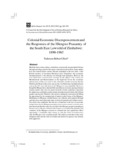Please use this identifier to cite or link to this item:
https://cris.library.msu.ac.zw//handle/11408/3859| Title: | Colonial Economic Disempowerment and the Responses of the Hlengwe Peasantry of the South East Lowveld of Zimbabwe: 1890-1965 | Authors: | Chisi, Taderera Hebert | Keywords: | colonialism economic disempowerment hlengwe peasantry 1890 - 1965 zimbabwe |
Issue Date: | 2014 | Publisher: | Council for the Development of Social Science Research in Africa & Association of African Historians | Series/Report no.: | Afrika Zamani, Nos 20-21, 2012-2013, pp. 165-194; | Abstract: | Much has been written on how colonialists economically incapacitated Africans through wrestling control of the means of production from them. Some studies have also looked at how various Africans responded to the new order. In the British territory of Southern Rhodesia (now Zimbabwe) the economic disempowerment of the Africans was through land alienation. However, the areas which have received much coverage on the subject in the country are Matabeleland and Mashonaland on the highveld. Given the economic attractiveness of these two areas to the colonialists and the resistance that the Ndebele and Shona in these areas put up, the overshadowing of peripheral areas such as the S.E. Lowveld, home to the Hlengwe is understandable. However, though the Hlengwe have attracted little more than an occasional passing reference in many studies, they were not spared from the colonial experience, especially the oppression, exploitation and economic disempowerment which other African groups experienced. Therefore, this article is primarily concerned with filling the gap created by the seeming lack of interest in the history of the Hlengwe. Information on Hlengwe colonial history was collected and compiled through oral interviews and a thorough study of archival materials and written sources. The article thus establishes that the loss of land led to the loss of economic independence by the Hlengwe peasantry whose main economic activities were land-based and that this same loss resulted in the Hlengwe people responding in diverse ways to the new colonial order. It goes on to explore the dynamics and variations of the Hlengwe response to colonial rule and exploitation. Most importantly, it establishes that contrary to what the Native Commissioners said, the Hlengwe were a warlike people. The article reveals that as they were integrated more into the orbit of colonial rule and felt its squeeze, they became more aggressive. | URI: | https://codesria.org/IMG/pdf/8._chisi.pdf?3799/fad126d7c417df870c15aa6f61a18ce75fd3afb2 http://hdl.handle.net/11408/3859 |
ISSN: | 0850-3079 |
| Appears in Collections: | Research Papers |
Files in This Item:
| File | Description | Size | Format | |
|---|---|---|---|---|
| HLENGWE DISPOSSESSION AFRIKA ZAMANI.pdf | Full Text | 172.29 kB | Adobe PDF |  View/Open |
Items in MSUIR are protected by copyright, with all rights reserved, unless otherwise indicated.



